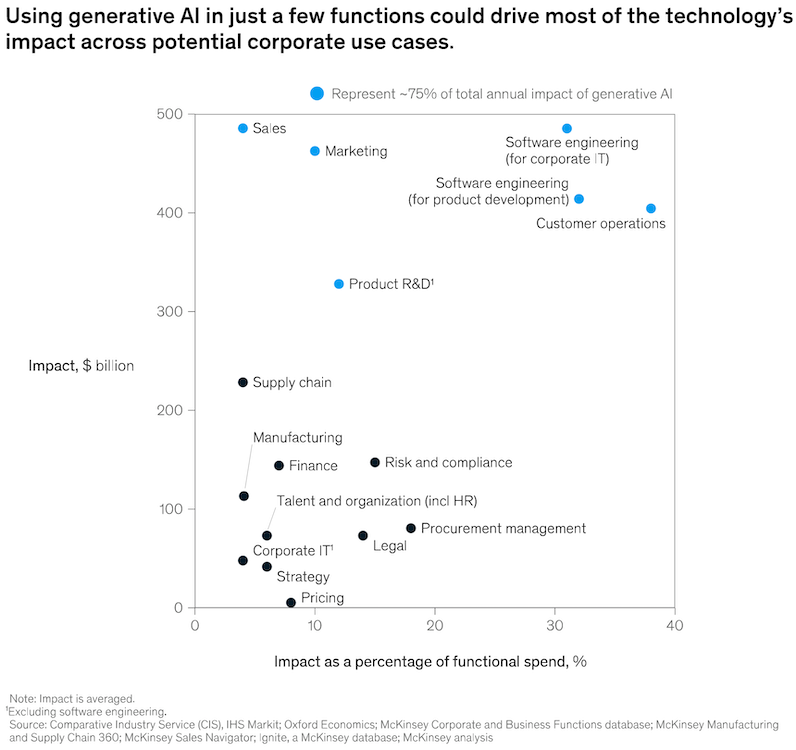In today’s rapidly evolving technological landscape, businesses are constantly seeking innovative solutions to enhance their operations and drive growth. By leveraging the power of generative AI, companies have the potential to unlock significant value and revolutionize various aspects of their business. McKinsey research estimates that generative AI could add $2.6 trillion to $4.4 trillion of value annually. In this article, we will explore some compelling use cases where generative AI can be applied to drive transformative outcomes.
Across industries, McKinsey estimates highest impact from generative AI in sales, marketing, software engineering and customer operations. (see figure below)

Based on my experience, majority of use cases fall into one of 4 categories:
- Synthesis of large text data
- Content generation
- Chatbots with domain knowledge
- Code generation
Let’s explore them in detail.
1. Synthesis of large text data
Dealing with vast amounts of text data has always been a challenge for businesses. Generative AI presents a game-changing opportunity to quickly synthesize large documents, saving valuable time and effort for knowledge workers. By employing generative AI algorithms, businesses can efficiently extract specific attributes from text data, enabling them to gain meaningful insights from dialogues, correspondence, and vast textual resources.
Specific use cases in this category include:
- Quick synthesis of large documents: research papers, legal documents.
- Extraction of particular attributes from the text data: sentiment, pricing.
- Insights from dialogues and correspondence: actions for each team member from conversation
2. Content generation
Personalization has become a critical aspect of modern marketing and customer engagement strategies. Generative AI enables businesses to create personalized content tailored to each customer’s unique circumstances and preferences. Whether it’s generating personalized product recommendations, crafting individualized marketing campaigns, or tailoring content for specific customer segments, generative AI proves to be a powerful tool in enhancing the customer experience and driving brand loyalty.
Specific use cases in this category include:
- Personalised marketing content for each customer based on their own circumstances.
- Writing articles
- Creating legal or other documents
3. Chatbots with domain knowledge
Chatbots have become increasingly prevalent in various industries, offering real-time support and seamless interactions with customers. Generative AI takes chatbot capabilities to a whole new level by providing domain knowledge expertise. These intelligent chatbots can serve as advisors in specialized fields such as legal, medical, engineering, and more, offering personalized and expert guidance to users. Moreover, businesses can deploy chatbots as sales agents, enhancing customer engagement and driving sales conversion rates. Additionally, chatbots can provide valuable support to customers, resolving queries efficiently and enhancing customer satisfaction.
Specific use cases in this category include:
- Chatbot as an internal or external advisor for legal, medical, engineering, etc
- Chatbot as sales agent
- Chatbot as support agent
4. Code generation
Software development is a complex and time-consuming process. However, generative AI can act as an invaluable co-pilot for developers, dramatically speeding up the code generation process. This technology can facilitate no-code app generation, empowering individuals with limited coding knowledge to create applications effortlessly. Additionally, generative AI can aid in template generation, automating the creation of standardized code structures, further streamlining development workflows.
Specific use cases in this category include:
- Co-pilot for developers
- No-code app generation
- Template generation
Final thoughts
As businesses continue to explore and adopt this technology, it is crucial to address ethical considerations and ensure responsible AI usage. Transparent and ethical deployment of generative AI will foster trust among customers and stakeholders, promoting the long-term sustainability and success of organizations.
In conclusion, embracing generative AI in the right manner will undoubtedly unlock new possibilities and propel businesses into a future of innovation and prosperity. As this technology continues to evolve, enterprises must remain at the forefront of its adoption to remain competitive and reap the full benefits of generative AI.
This article reflects my personal views and opinions only, which may be different from the companies and employers that I am associated with.
